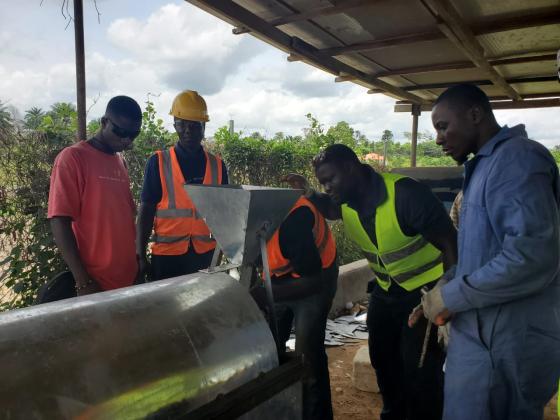Liberia: Ensuring Sustainable Agriculture

Artisans at work as their trainer, Dr. Roger Ahouansou, supervises them.
…AfricaRice Trains local artisans in agric machines fabrication
As Liberians crave for a shift from subsistence and labor-intensive farming practices to a mechanized process that would help make agriculture more profitable and sustainable, AfricaRice has recommenced strengthening the capacity of the local manufacturers to fabricate Rice parboilers, rice graders and pellet machines. The parboiler and grader equipment are important improved post-harvest technologies for rice in Liberia and other sub-Saharan Africa (SSA) countries, while the pellet machine is used for the production of feeds for fish that are reared in ponds.
Manual rice grading and local parboiling techniques are common in Liberia and primarily done by women farmers. It is not only labor-intensive, painstaking, and risky health-wise, but it also leads to heavy post-harvest crop losses. The machines were developed by AfricaRice and its partners to speed up post-harvest processes, produce a higher quality product, increase the marketability of local rice, and lessen the burden on women.
Local artisans were drawn from ten of the 15 counties to undergo the week-long training that has been taking place at the Moon-Light Technical Workshop in Gbarnga, Bong County.
The training is one of the activities designed under the EU-funded DeSIRA Integrated Rice-Fish Farming System (IRFFS) project to strengthen food and nutrition security in Liberia.
AfricaRice Country Representative, Dr. Innousa Akintayo, said that the need for investment in the agricultural sector is paramount now than ever before as the world braces itself for the impacts of climate change.
“A shift to mechanized farming is paramount if Liberia is to become food sufficient and produce enough for export. We need to begin on the path of climate smart investment now, and there are equipment that we need locally to ensure that we succeed,” Dr. Akintayo said. “But for this to happen, there is a need to have local technicians who will be able to produce the machines that the farmers need. We need a pool of local knowledge that will ensure that the process is sustainable. It is against this backdrop that we have started training.”
Akintayo said the training will empower fabricators across the country to open workshops where they will produce farming equipment that farmers need. “We brought these artisans here to hone their skills and empower them technically so that they can be of help to their farming communities,” he said. We are glad that the EU-funded DeSIRA Integrated Rice-Farming System is facilitating this transition by building the capacity of local fabricators as well as the farmers on the use of the equipment.”
At the training workshop, AfricaRice Agro-processing and Mechanization Expert, Dr. Roger Ahouansou, coached the local fabricators on how to cut and assemble the equipment.
During the hands-on training, graders, parboilers, and pelletizers were successfully constructed and tested at the workshop and all necessary technical adjustments were made.
“It is expected that the training of local equipment manufacturers in the fabrication and out-scaling of these technologies in the Rice Sector will enhance the timely execution of post-harvest operations and substantially reduce post-harvest losses,” said Ahouansou.
“We have brought these technicians here to add to their knowledge on how to produce equipment that the farmers need. This, we think, is a great step as it will help ensure sustainability when the project ends,” Ahouansou said. “We want fabricators at the community level who will work with the farmers to ensure that the operations are not interrupted due to lack of equipment.
Training of end-users, especially the youth, will be organized, on the use and maintenance of the equipment in the rice production sector as service providers for farmers.
However, it is anticipated that the wide dissemination of the equipment will facilitate the involvement of private business in rice value chain activities and contribute to the creation of employment for the youth and women.
The use of the post-harvest equipment will also improve grain quality. This is very important as higher grain quality is a prerequisite for competitiveness against imports that cost Liberia much valuable foreign exchange.
The beneficiaries of the training, who were very busy at work, lauded AfricaRice and the European Union for the opportunities to gain more knowledge on the production of farming equipment. “We have gotten added skills that will help us not to only be of great help to our communities but to also empower us economically because this is a huge business opportunity,” one of the participants said.
Meanwhile, the IRFFS project is a three-year project (2020-2021), that is being implemented by Africa Rice, World Fish in collaboration with the Ministry of Agriculture (MoA), National Aquaculture and Fisheries Authority (NaFAA), and Central Agricultural Research Institute (CARI).
The IRFFS project aims to improve food and nutrition security by transforming low-yielding, climate-risky traditional rice-fish production systems into more climate-resilient, high-yielding, resource-use-efficient systems in Liberia. It is being implemented in five counties — Gbarpolu, Grand Gedeh, Maryland, Margibi, and River Gee counties.
